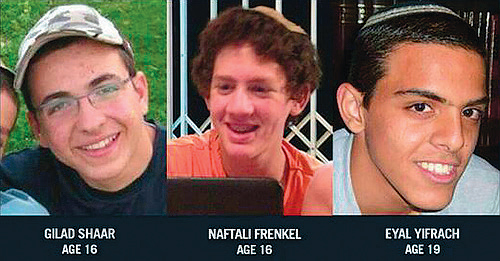
Teaneck—A number of local students are acquainted with at least two of the kidnapped Israeli boys, Naftali Frenkel and Gilad Shaar, because MTA, the Yeshiva University High School for Boys, operates a six-week exchange program with Makor Chaim Yeshiva, the yeshiva high school in Kfar Etzion where two of the three boys are students. The third kidnapped boy, Eyal Yifrach, is a student at Shaavei Chevron.
“I learned in Yeshivat Makor Chaim for six weeks during the middle of my sophomore year at MTA. Naftali learned in the beit midrash right next to me,” said Yehoshua Szafranski of Teaneck, 18, who graduated from MTA this past week. “I remember the screaming and passion that would ensue when he and his chavrusa would get into heated debates over the sugya, striving for clarity and truth. The drive that he has inspired me to take advantage of every second that I was in the beit midrash. His fire contributed immensely to the avira of the yeshiva and ignited and motivated all of those who were around him,” said Szfranski.
“I wasn’t close with them but I recognized who it was when I saw the pictures,” said Aryeh Burg, 17, an MTA rising senior from Bergenfield who exchanged at Makor Chaim last year. Burg shared that he has spoken with many of his friends at the school in recent days. “Makor Chaim itself is a close knit family and they feel like they have lost brothers. It’s someone who they have spent their entire high school career with, who they spend their entire day with. Part of their family unit is missing,” he said.
“They have that warm kind of yeshiva, where everybody knows everyone. Even though there are a few hundred students and it’s an elite school, it’s a heimish place,” said Rabbi Michael Taubes, Rosh Yeshiva of MTA. Taubes has visited Makor Chaim a number of times, and said that while there are not currently any Bergen County rabbeim on the faculty, a son-in-law of YU Rosh Yeshiva Rabbi Moshe Tendler is a rebbe there.
Makor Chaim and MTA have been operating their elite exchange program for the past six years. Between ten and twelve MTA students are selected on a competitive basis each year to exchange at Makor Chaim. Szafranski shared that he has been organizing numerous learning events and tehillim groups around Teaneck and has been in touch with his friends at Makor Chaim. “They appreciate the support immensely and encouraged me (and everyone) to keep up and advance our efforts. One I Skyped with said: “Amidst all of the tears, Yeshiva has been filled with an avira of hope, we feel all of your prayer and Torah coming through the doors of the beit midrash as we pray and learn.”
“My shul have been saying tehillim every day and everyone still at school is saying tehillim as soon as they finish their finals,” Burg said.
Rabbi Taubes shared that the Rabbinical Council of Bergen County sponsored a number of tehillim sessions in shuls all around Bergen County this past Sunday, and most shuls continue to say tehillim after each minyan. They will continue to do so, he said.
In regard to the safety situation at the yeshiva, “All the boys going to that yeshiva live in the dorms,” said Tova Rosenberg, director of exchange programs and Hebrew language at both MTA and Central (Yeshiva University’s High School for Girls). She explained that since the boys stay late at yeshiva on Thursday night, they sleep there and go home in the morning on Friday to their families.
Rosenberg said that security at the school is very tight. Makor Chaim is physically located on Kibbutz Kfar Etzion. There is security around the kibbutz, a security guard at the entrance and fences around the yeshiva and codes to get in and out of the dormitory area. There are more guards at night, she said.
“All the boys who participate in our program—in Gush Etzion and in New York—don’t go anywhere without staff chaperones, or teachers I am allowing to accompany them. They don’t go anywhere—are not allowed to go anywhere—without supervision. They have one free Shabbat to go to their own family, but have to be picked up and dropped off by family. Adults sign them in and out,” Rosenberg said.
“I felt very safe when I was there,” said Burg. “We did have our share of lockdown drills. Sometime they said, ‘We’re just going to stay inside, someone may have come too close to the gate.’” but I always felt very safe. “We knew we were surrounded by Arab villages, but no one there feels really threatened by anything,” he said.
By Elizabeth Kratz













